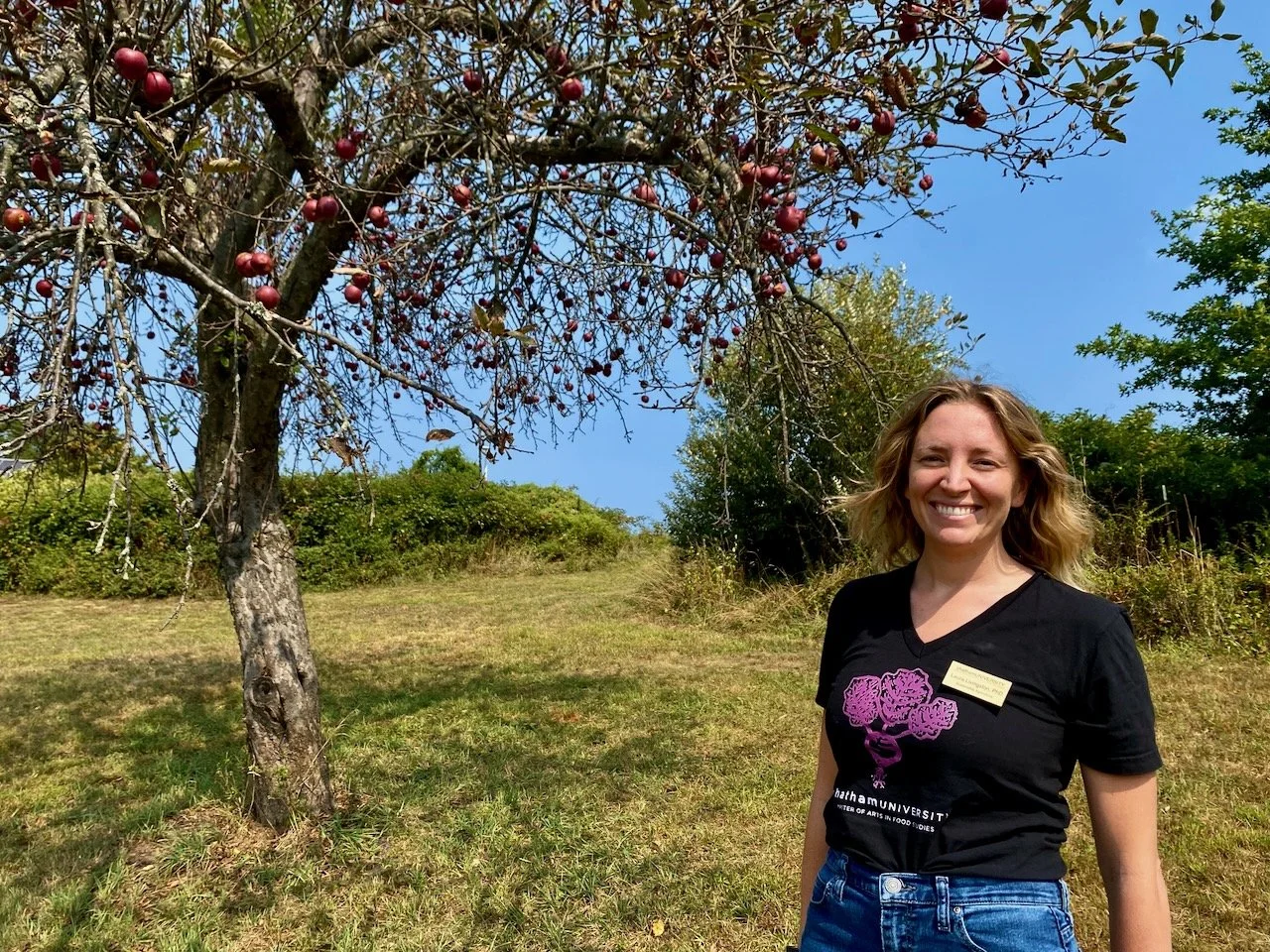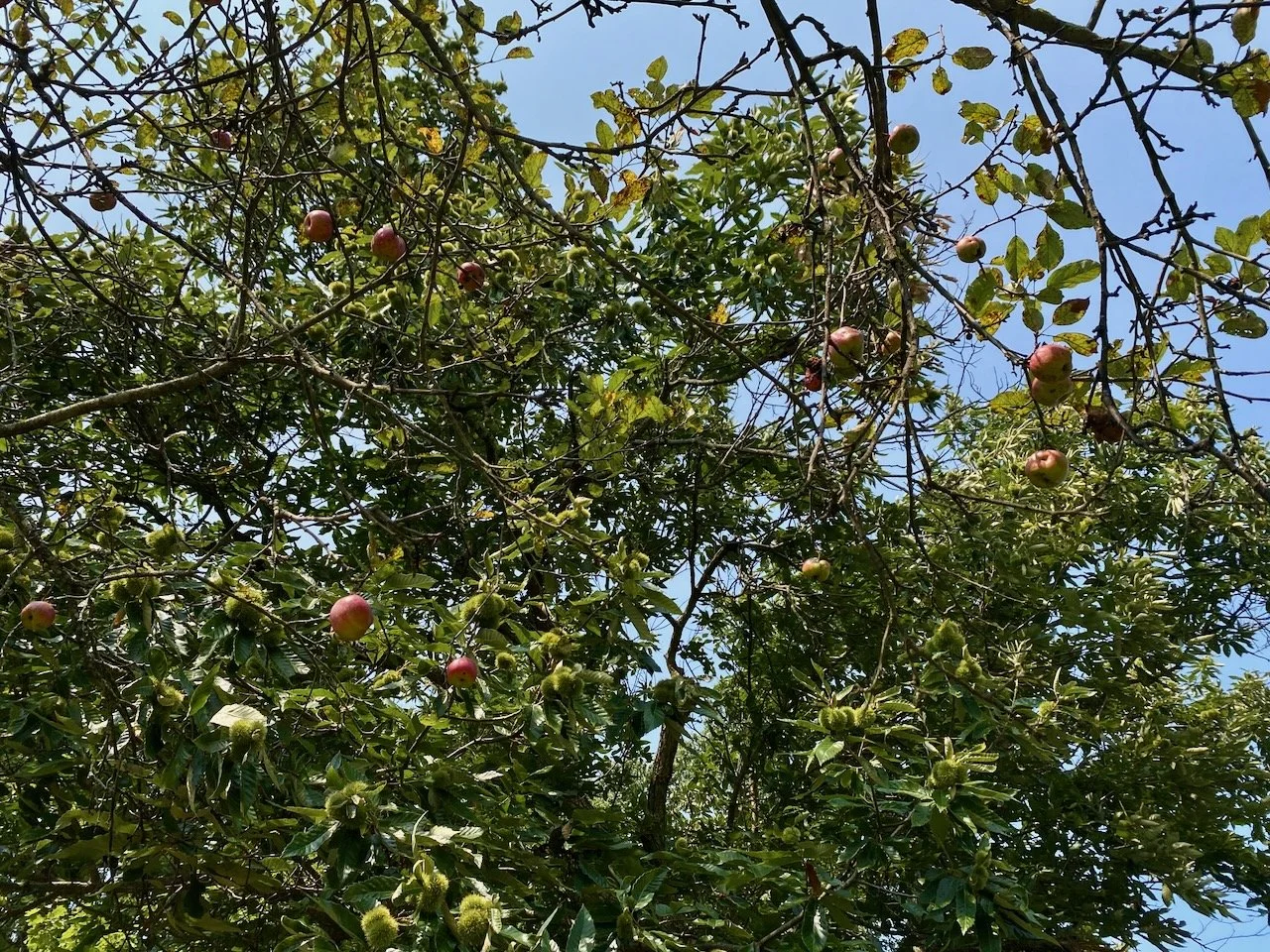This Year’s Eden Hall Day is All About Apples
Laura Livingston, Chatham University’s director of sustainable agriculture and an assistant professor of food studies, poses in front of an apple tree at Eden Hall.
When Chatham University first acquired Eden Hall in 2008, its heritage apple orchard was in rough shape: it was neglected, pest ridden, and covered in poison ivy. Nadine Lehrer remembers.
“We would tell people not even to go there unless they were immune to poison ivy, because it was very, very widespread,” says Lehrer, an associate professor of food studies who joined Chatham in 2012. “There hadn’t been pruning in many, many years, so there were dead limbs that were hanging on.”
But now it’s much different. This year, the apple orchard will serve as the focal point for Eden Hall Day on Saturday, Sept. 13. Billed as “Apples for All!,” the programming will include apple picking, apple baking at the campus pizza oven, and apple pressing to make cider. More details and a registration page are available on my.chatham.edu.
It’s the kind of event that wouldn’t have been possible just 10 years ago, when most of the apples in the old orchard were only suitable for cider. Over the years, dozens of people contributed to beautifying and maintaining the orchard at Eden Hall.
Before Eden Hall was part of Chatham University, it was a summer retreat for women who worked at the H.J. Heinz Corporation. Sebastian Mueller, a Heinz relative and higher-up at the company, purchased the land in 1912 and developed it into Eden Hall Farm.
During those days, the apple orchard likely had approximately a hundred trees, according to Maria Joseph, MAFS ’13, who researched the history of the orchard as part of her thesis. Now, about two dozen of those trees remain.
The farm was gifted to Chatham in 2008 by the Eden Hall Foundation, which was established in the decades following Mueller’s death. The campus opened in 2014; that’s when the farm managers and their team started working on the orchard.
Lehrer got involved because of her experience doing urban forestry with the City of New York and her time in Washington state, where she was working with commercial apple orchards. She says the rehabilitation process started bit by bit, beginning with clearing the poison ivy. Some of the goats at Eden Hall helped with that.
“We had goats for a number of years at Eden Hall,” Lehrer says. “And even before we had them, I had goats and lived nearby at the time. Goats are not allergic to poison ivy, so you can put goats into poison ivy and have them eat it.” Then, workers would get in and finish the job to keep the vines and weeds from growing back.
“It was very slowly chipped away at over time,” she says.
Apples hang from the trees in the Eden Hall orchard.
Over the years, graduate students, faculty, and members of the Eden Hall farm team continued with periodic pruning and apple picking. Representatives from Soergel Orchards gave the Chatham team demonstrations in how to prune older trees. Because the trees are of a “standard” size—larger than the dwarf trees that are found among today’s commercial apple farms—students had to use ladders and long poles to reach the fruit.
Since most of the apples were unfit for eating fresh, either due to texture, flavor, or worm holes, they were pressed into cider.
Apple pressing is among the activities planned for this year’s Eden Hall Day, where the progress of the orchard will be on full display. Laura Livingston, the director of sustainable agriculture and an assistant professor of food studies, planned the programming.
“It’s more food studies oriented and also farm oriented,” Livingston says, referring to the apple picking, pressing, and baking that’ll be part of Eden Hall Day.
“It’s not something we get to pick every year […] because there’s years there are more apples than other years, depending on seasonality and frost dates,” Livingston says. “But, whenever there are apples, I try to make sure we do take advantage of that opportunity.”
At 9 a.m., a shuttle will bring students from Shadyside Campus to Eden Hall. An hour later, the apple picking begins. After that, students will be put into two groups to either bake apple pizzas with the campus fire master or press cider with professor Ryan Utz, who helped start the apple-gleaning and cider-pressing group A Few Bad Apples. Lunch is also available from 12-1 p.m. for registrants.
When the event is over, students can hop back on the shuttle at 2 p.m. to return to Shadyside, perhaps taking some apples and cider with them. Participants will want to make sure they’re at Eden Hall by 10 a.m. to get the full experience.
But Lehrer also says she wants students to know they can go into the orchard and take in the beauty of the space at any time. That’s part of the reason why so many people worked hard on it for so many years.
“It’s not that common to have an old orchard like that,” Lehrer says. “It’s … a nod to the history of Eden Hall and Mueller and the things that came before.”


